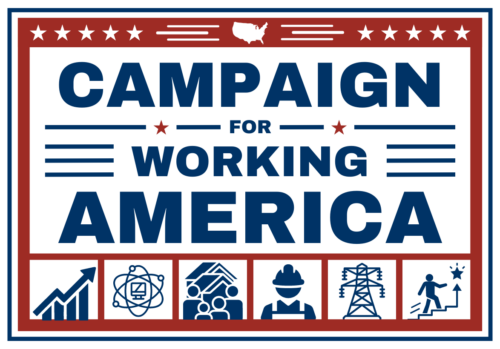
The Progressive Policy Institute launched its Campaign for Working America in February 2024. Its mission is to develop and test new themes, ideas, and policy proposals that can help Democrats and other center-left leaders make a new economic offer to working Americans, find common ground on polarizing cultural issues like immigration, crime, and education, and rally public support for defending freedom and democracy in a dangerous world. Acting as Senior Adviser to the Campaign is former U.S. Representative Tim Ryan, who represented northeast Ohio in Congress from 2003 to 2023.
Since 2016, Democrats have suffered severe erosion among non-college white voters and lately have been losing support from Black, Hispanic, and Asian working-class voters as well. Since these voters account for about threequarters of registered voters, basic electoral math dictates that the party will have to do better with them to restore its competitiveness outside metro centers and build lasting governing majorities. The party’s history and legacy point in the same direction: Democrats do best when they champion the economic aspirations and moral outlook of ordinary working Americans.
To help them relocate this political north star and to inform our work on policy innovation, PPI has commissioned a series of YouGov polls on the beliefs and political attitudes of non-college voters, with a particular focus on the battleground states that have decided the outcome of recent national elections.
This report is the first in a series of Campaign Blueprints detailing new ideas that can help Democrats reach across today’s yawning “diploma divide” and reconnect with the working-class voters who have historically been the party’s mainstay.
In the 21st century, education has become America’s most significant marker of class privilege. People with bachelor’s and advanced degrees have mostly prospered, while wages for those with less education have fallen. This divergence in economic fortunes lies at the heart of our country’s present economic and political discontents.
In days past, Americans could get good jobs that paid a family-sustaining wage with just a high school diploma. In today’s increasingly intangible and data-driven economy, most jobs require at least some postsecondary education and training due to automation and technological advancements — demanding different knowledge and skills. If we don’t act now to prepare our current and future workers for these opportunities, more Americans will experience downward mobility and fall further behind.
Some Washington policymakers think we can solve this with “college for all.” It’s true that, on average, a bachelor’s degree confers higher lifetime earnings on those who have them. But most Americans don’t earn degrees. Today, 62% of American adults have no bachelor’s degree, and that number rises to 72% for Black adults and 79% for Hispanic adults. Despite this reality, federal and state policies remain strongly biased in favor of subsidies to Americans who go to college, specifically those who acquire a 4-year degree. In 2018, the federal government spent roughly $149 billion on higher education versus $58 billion for workforce-related education and training. Since the latter figure also includes Pell Grants and veterans’ programs, Washington really only spent about $16 billion, spread across 17 separate federal programs that provide workforce-focused education, employment, and training assistance.
The nation’s chronic underinvestment in work-related learning, experiences, and supports isn’t just unjust, it’s bad economics. It squanders our most precious resource — our workers — and subtracts from U.S. productivity growth and competitiveness.
American workers deserve better than a binary choice between an overpriced college degree program and a patchwork of public and private job training programs of uneven quality. Instead, U.S. leaders should equalize opportunity for workers, regardless of what path they choose. This means building a world-class education system that is inclusive of all options, not just college, to ensure greater upward mobility for American workers.